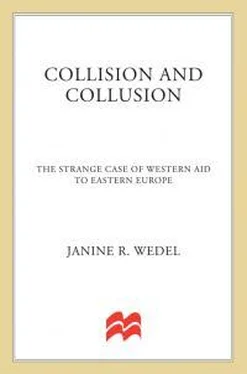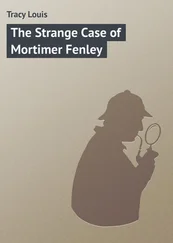52. See James B. Silberman and Charles Weiss, Jr., A History of the Technical Assistance Programs of the Marshall Plan and Successor Agencies, 1948-1961, Washington, D.C.: World Bank, Industrial Policy Group, November 1992.
53. Interview with Witold Trzeciakowski, May 10, 1997.
54. Cited in Janine R. Wedel, “Beware Western Governments Bearing Gifts,” Wall Street Journal Europe, January 14, 1992.
55. Reported by Blaine Harden, “Poles Sour on Capitalism,” Washington Post, February 5, 1992, p. A1.
56. Béla Kádár, “Where Have all the Dollars Gone?” Transition: The Newsletter about Reforming Economies, Transition Economics Division Policy Research Department, World Bank, vol. 4, no. 5, June 1993, p. 5.
57. This figure represents average disbursement rates for nine G-24 countries and the EU for total committed assistance to Central and Eastern Europe (Raymond Barre, William H. Luers, Anthony Solomon and Krzysztof J. Ners, Moving Beyond Assistance, New York, NY: Institute for East West Studies, June 1992).
58. Former Soviet Union: U.S. Bilateral Program Lacks Effective Coordination, Washington, D.C.: U.S. General Accounting Office, February 1995, p. 5.
59. Former Soviet Union: U.S. Bilateral Program Lacks Effective Coordination, Washington, D.C.: U.S. General Accounting Office, February 1995.
60. Robert L. Hutchings, “Statement of Ambassador Robert L. Hutchings, Special Adviser for East European Assistance, Department of State, before the Subcommittee on Foreign Operations, House Committee on Appropriations,” April 19, 1993, p. 4.
61. Several participants emphasized this point at the working conference co-organized by the author in April 1995 and cosponsored by the Woodrow Wilson International Center for Scholars and the Friedrich Ebert Stiftung. See report of the conference by John Harper and Janine R. Wedel, Western Aid to Central and Eastern Europe: What We are Doing Right, What We are Doing Wrong, and How We can Do it Better, East European Studies Occasional Paper: Woodrow Wilson International Center for Scholars, no. 41, September 1995, p. 24.
62. Kirsty Hughes, Philip Taylor, and Ian Christie, “Evaluation of Technical Assistance to Hungary,” Policy Studies Institute (PSI), published by the Department for Education and Employment as Research Series no. 70; excerpts republished in C. M. Hann, The Skeleton at the Feast: Contributions to East European Anthropology, Canterbury, United Kingdom: University of Kent at Canterbury, Centre for Social Anthropology and Computing, 1995, p. 228.
63. Interview with Alan Mayhew, May 15, 1996.
64. Institute for East West Studies, Annual Report, 1992-93, New York, NY: Institute for East West Studies, p. 23.
65. CCET Register Statistics, published by the Centre for Co-operation with Economies in Transition, Paris, France: OECD, June 1994.
66. See John Harper and Janine R. Wedel, Western Aid to Central and Eastern Europe: What We are Doing Right, What We are Doing Wrong, and How We can Do it Better, East European Studies Occasional Paper no. 41: Woodrow Wilson International Center for Scholars, September 1995, pp. 24-25.
Some donor representatives offered the view that there were relatively few projects worth funding (for example, interview with Witold Radwanski, deputy director of the European Bank for Reconstruction and Development in Warsaw, April 6, 1994). But once a project got under way, there were sometimes opportunities for coordination and division of tasks among donors.
67. Interview with Alan Mayhew, May 15, 1996.
68. Participants at the working conference of April 1995 addressed organizational barriers to flexibility and risk and generally agreed that “Although successful aid programs require informed risk taking and flexibility, administrative and evaluation procedures tended to discourage, rather than encourage, risk taking” (John Harper and Janine R. Wedel, Western Aid to Central and Eastern Europe: What We are Doing Right, What We are Doing Wrong, and How We can Do it Better, East European Studies Occasional Paper no. 41: Woodrow Wilson International Center for Scholars, No. 41, September 1995, p. 24).
69. The system of contracting was born with the “outsourcing” of defense contracts during World War II in the United States. As outsourcing expanded during the Cold War (both in the United States and in Western Europe), so did a body of regulations and procedures for hiring and holding accountable contractors, as well as ideas about the merits of employing contractors versus civil servants (Daniel Guttman, Contracting for Government, Washington, D.C.: Distributed by the National Academy of Public Administration, January 1997; and conversations with Daniel Guttman, an expert on government contracting for the performance of public functions).
70. “Wspólczesny Plan Marshalla?” Nowa Europa, April 4, 1994.
71. John Harper and Janine R. Wedel, Western Aid to Central and Eastern Europe: What We are Doing Right, What We are Doing Wrong, and How We can Do it Better, East European Studies Occasional paper: Woodrow Wilson International Center for Scholars, no. 41, September 1995, p 24.
72. Confirming these findings, the GAO reported that “a U.S. official in Poland told us that decisionmakers in Washington did not seek advice on projects from in-country staff, even though these staff members have first-hand knowledge of the country’s conditions and monitor U.S. assistance efforts. In some cases, decisionmakers in Washington have ignored recommended actions from in-country staff.” ( Poland and Hungary: Economic Transition and U.S. Assistance, Washington, D.C.: U.S. General Accounting Office, May 1992, pp. 33-34.)
73. House of Representatives, Foreign Operation, Export Financing, and Related Programs Appropriations Bill, report 102-585, June 18, 1992, pp. 34-36.
74. Further frustrating in-country input was the “regional approach.” Under this approach, aid to Central and Eastern Europe was targeted to a region, rather than to an individual nation, thereby suggesting the dominance of political goals over developmental ones. This approach maximized Washington’s control: regional, rather than country-specific, allocations meant that Washington could shift focus from one country to another when American domestic pressures changed or when a country failed to curry sufficient favor. The chief justification for the regional approach—that many problems such as environmental ones cross national boundaries and therefore should be addressed regionally—overlooked the fact that each country designed and implemented its own policies. Indeed, some recipient aid officials complained that the regional approach encouraged competition among Central and Eastern European nations and complicated planning and monitoring.
75. General Accounting Office, Poland and Hungary: Economic Transition and U.S. Assistance, Washington, D.C.: U.S. General Accounting Office, May 1992, p. 34; Janine R. Wedel, “Beware Western Governments Sending Gifts,” Wall Street Journal Europe, January 14, 1992.
76. General Accounting Office, Poland and Hungary: Economic Transition and U.S. Assistance, Washington, D.C.: U.S. General Accounting Office, May 1992, p. 34.
77. Biuletyn Z Posiedzenia Komisji do Spraw Układu Europejskiego, nr 7, Warsaw, Poland: Kancelaria Sejmu, Biuro Informacynje, nr. 311, II kad., February 16, 1994, p. 15.
78. For further discussion of recipient input, see Janine R. Wedel, “U.S. Aid to Central and Eastern Europe, 1990-1994: An Analysis of Aid Models and Responses,” East-Central European Economies in Transition: Study Papers submitted to the Joint Economic Committee Congress of the United States, November 1994; republished in East-Central European Economies in Transition, editors John P. Hardt and Richard F. Kaufman, for the Joint Economic Committee Congress of the United States, New York, NY: M. E. Sharpe, 1995.
Читать дальше












